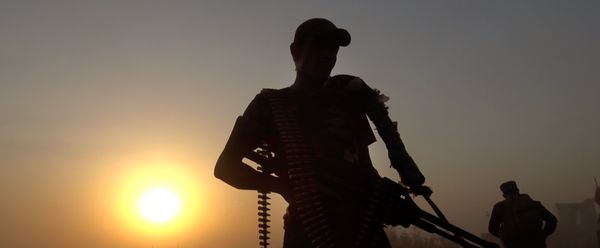The subtitle is a quote spoken in this documentary; an appropriate sentiment once through the gauntlet of heartache on screen. Documentaries about war often tout the beginning, middle and end of a conflict, glorifying the victory or lamenting defeat, usually from the perspective of a particular side. A topic rarely reported on is the aftermath of a military theater and the rebuilding, or in this case, the unrest left in its wake. Mosul sheds light on the stark reality one city endured following the American-led war in Iraq.
The story begins in 2016 when an ISIS terrorist group, the Daesh, took advantage of the Iraqi defeat in order to cripple the city of Mosul through abhorrence and slaughter. Director Daniel Gabriel, a former CIA counter-terrorism officer, follows journalist Ali Maula as he interviews rebels, Iraqi soldiers and an imprisoned ISIS agent, to tell the story of a city fighting back.
What They Left Behind
Eye-opening in its frankness, the film explains how the Daesh came to power through the supply of weapons and tanks abandoned when foreign divisions withdrew from Iraq. The country was left rudderless, creating a struggle between the government and terrorist cells looking to gain control over a newly fallen society. The coming months gave way to beheadings, torture and live burnings for crimes against the ruling Daesh. Towns ablaze, women and children used as human shields, all shown in graphic detail. This film pulls no punches in the visual realness it means to convey. If you trigger easily, please be warned.

In a surreal moment, a small boy herding soot-blackened sheep explains how men came through pouring several gallons of sulfur into the water supply and setting it on fire. The laissez-faire expression on his face telegraphs a way of life he has grown accustomed to; a similar reaction was shared by many of the children when speaking frankly to the journalist.
When asked about their education, one of the older boys let out a sarcastic giggle before revealing he had not been to school since the fourth grade because there were no schools left standing. This grim humor working as an unfortunate coping mechanism only heightens the emotion of the scene. So much of what is documented seems post-apocalyptic, yet when put into perspective, serves as a sad reminder of who the victims are.
Finding Truth In The Chaos
Throughout the film, journalist Ali Maula comes across a broad array of colorful individuals, each with a harrowing story to tell. Secular in their pursuit of freedom, religion takes a back seat in unifying the people against a common enemy. An example of this mentality is reflected early on with the introduction of the fearless Um Hanadi, a female leader in the People’s Mobilization Force, a state-sponsored militia.
After losing her husband to the Daesh, she continued the fight and became one of the main targets of terrorist circles. Despite her high rank she still cooks for her soldiers and family as she always had before the chaos. Then there’s Sheikh “The Crocodile” Saleh, also referred to as a warrior poet, spouting verbose soliloquies about whatever he deems more vital than the straight-forward questions inquired by Maula.
In some of the more heroic beats, we are introduced to boots on the ground lead by Captain Alaa Atah of the Iraqi Emergency Response Brigade, a military leader who selflessly guides his troops into areas besieged by the Daesh. Capt. Atah explains how they could easily bomb these villages in an effort to thwart the insurgency but the loss of civilian lives would outweigh the victory.
Logical from a humanitarian view, he understands the risks of meeting the Daesh head-on in order to preserve the lives of the innocent who get caught in the crossfire. The battles fought are captured in graphic detail as the intrepid crew follows the soldiers through a haze of bullets and chaos. Heart-wrenching in its visuals, the uninitiated are served a barrage of dramatic moments which embed the viewer deeper into the turmoil with each passing second.
Campfire war stories exemplify the strong camaraderie amongst the troops while also addressing post-traumatic stress disorder in a bittersweet segment with a stoic soldier who had taken to raising animals as a way of coping with mental stresses. These tender moments leave traces of hope in an otherwise morbid narrative.
Empathy Through Information
Wrapping up the plethora of personal experiences of all involved, the postscript informs of the present situation in the region since the victory over the Daesh in 2017. Maula expresses the uncertainty of what’s to come for Mosul and Iraq as a whole, ending the film on a deservedly somber note. Mosul thrusts the audience into its world with unwavering relentlessness while allowing ample time to reflect. Gritty, powerful and honest, the film begs to be experienced, discussed, and remembered.
The art of documentary film can be a powerful tool for change in our world and the Film Inquiry community would like to know of ones that you find impactful. Leave your suggestions in the comments section.
Mosul premiered at the Cleveland International Film Festival on April 5th, 2019. Its official release for digital distribution via Gravitas Ventures is May 14th, 2019.
https://www.youtube.com/watch?v=TKkA8eNFDSQDoes content like this matter to you?
Become a Member and support film journalism. Unlock access to all of Film Inquiry`s great articles. Join a community of like-minded readers who are passionate about cinema - get access to our private members Network, give back to independent filmmakers, and more.